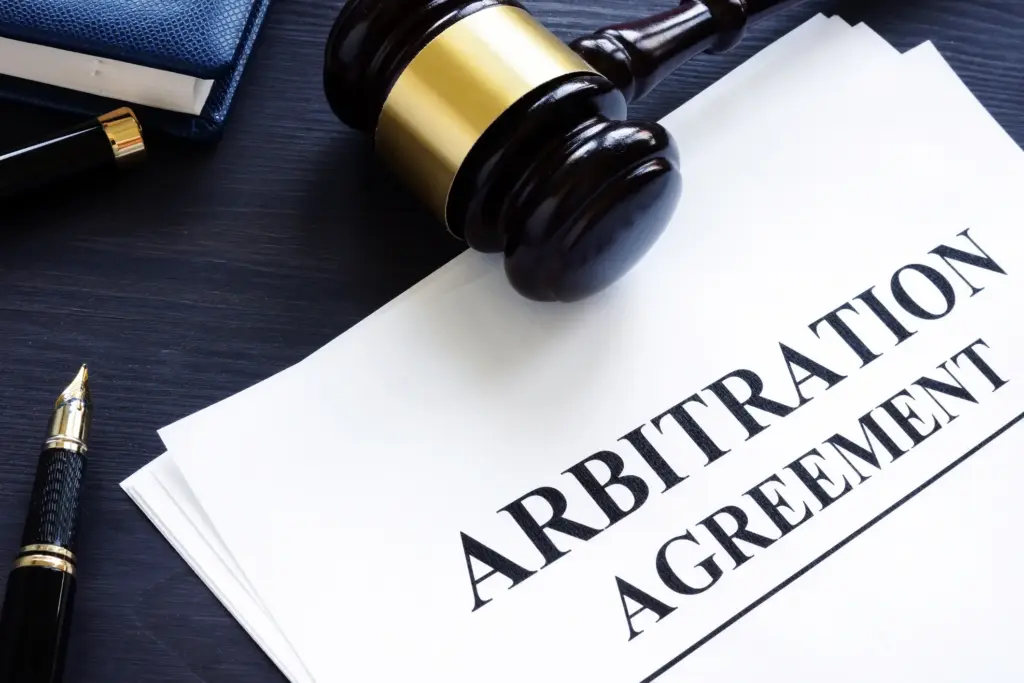Whether you’re dealing with a car accident claim, a business disagreement or a consumer issue in California, how you resolve it—arbitration or litigation—can impact your outcome, wallet and peace of mind. At West Coast Trial Lawyers, we’ve guided thousands of clients through these decisions, securing millions in recovery with over 20 years of combined experience.
In this article we break down the differences between arbitration and litigation so you can make an informed decision and avoid costly mistakes.
What Is Litigation?

Litigation is the courtroom drama you see in movies: one party sues another and a judge or jury decides in a public court. In California, this process follows strict rules under the Code of Civil Procedure, involving formal steps like filing a complaint, gathering evidence (discovery) and arguing before a judge.
How Litigation Works
- Filing: You (the plaintiff) file a complaint outlining your grievance, such as injuries from a car accident caused by a negligent driver.
- Response: The defendant answers, admitting or denying your claims.
- Discovery: Both sides exchange evidence, like medical records or witness statements.
- Trial: Arguments are presented and a judge or jury issues a ruling which can be appealed if errors occur.
Timeline
Litigation is no quick fix. In California, personal injury cases can take 6 months to several years especially with complex claims or crowded court dockets (e.g. Los Angeles Superior Court). Should either side file for appeals, it can stretch out the case, further adding stress and costs.
When to Choose Litigation
- You need a public record to hold a party accountable, like a reckless driver.
- You anticipate needing to appeal an unfavorable decision.
- You want a formal legal precedent, common in business or product liability disputes.
What Is Arbitration?
Arbitration is like a private courtroom where a neutral third party—an arbitrator—hears both sides and makes a decision. It’s less formal, often faster and common in contracts for rideshare services, employment or consumer goods in California.
How Arbitration Works
- Agreement: Both parties agree to arbitrate, often through a contract clause (e.g. in Uber’s terms of service).
- Hearing: You present evidence and arguments to an arbitrator, often an expert in the field, in a private setting.
- Decision: The arbitrator issues a ruling, which is binding (final) or non-binding (you can still go to court).
Binding vs. Non-Binding Arbitration
- Binding: The decision is final, with no appeal except in rare cases like fraud (California Code of Civil Procedure Section 1286.2 ).
- Non-Binding: You can reject the outcome and pursue litigation, offering flexibility but less finality.
When to Choose Arbitration
- You value privacy, keeping sensitive details out of public records.
- You need a faster resolution, often critical for personal injury or small business disputes.
- The case involves technical issues, like defective car parts, where an expert arbitrator’s insight is valuable.
Key Differences Between Arbitration and Litigation
Choosing between arbitration and litigation hinges on five key factors:
Cost
Arbitration is often cheaper due to fewer procedures and no court fees, but complex cases with multiple arbitrators can rival litigation costs. In California, litigation expenses—attorney fees, discovery and court filings—can exceed $50,000 for personal injury cases, per the California Bar Association.
Time
Arbitration typically resolves in months, while litigation can drag on for years, especially in busy jurisdictions like Los Angeles or San Francisco.
Formality
Litigation follows rigid rules (e.g. California Rules of Court), while arbitration allows flexible procedures, like relaxed evidence rules, agreed upon by both parties.
Privacy
Litigation is public, exposing details in court records. Arbitration is confidential, ideal for businesses or individuals seeking discretion.
Appeals
Litigation allows appeals, giving you a second chance if the ruling is unfair. Arbitration’s binding decisions are final, except in extreme cases.
Litigation Pros and Cons
Pros
- Strong enforcement through California courts, ensuring rulings are upheld.
- Right to appeal, protecting against judicial errors.
- Public record can deter misconduct, like a company’s negligence in a product liability case.
Cons
- Time-intensive, with delays from motions or court schedules.
- Expensive, with legal fees and discovery costs piling up.
- Adversarial, increasing stress in contentious disputes like car accident claims.
Arbitration Pros and Cons
Pros
Faster, in 3–6 months, according to the American Arbitration Association.
- Private, keeping personal injury or business disputes out of the public eye.
- Flexible, with procedures tailored to your case.
Cons
- Limited appeals, so you’re stuck with an unfavorable decision.
- Arbitrator bias, especially if they’re industry insiders (e.g., in employment disputes).
- Costs can add up with multiple arbitrators or complex cases.
Watch Out for Contract Clauses
Many California contracts—think rideshare apps, employment agreements or product warranties—have mandatory arbitration clauses. These force you to arbitrate disputes, waiving your right to sue in court. For example, signing up for Lyft means agreeing to arbitrate any accident claims. As such, it is always read the fine print, as these clauses can limit your options. West Coast Trial Lawyers can review contracts to challenge unfair clauses under California’s Unfair Competition Law (Business and Professions Code Section 17200).
International Disputes
For cross-border contracts, like a California business dealing with an overseas supplier, arbitration is often preferred. The New York Convention makes sure arbitration awards are enforceable in over 160 countries, unlike court rulings which may not be recognized abroad.
Can You Switch from Arbitration to Litigation?
Switching is tough, but California courts enforce valid arbitration agreements (Code of Civil Procedure Section 1281), so you can’t litigate unless the clause is unconscionable or fraudulently induced. If you’re stuck in arbitration, our team can strategize to get the best outcome within that process.
How to Prepare for Arbitration or Litigation
- Hire Experienced Counsel: Choose a lawyer who knows both arbitration and litigation, like West Coast Trial Lawyers.
- Gather Evidence: Collect documents, photos or witness statements. For example, in a car accident case, medical records and police reports are key.
- Understand the Process: Litigation requires formal filings, while arbitration may involve choosing an arbitrator or setting hearing rules.
Common Myths
- “Arbitration is always cheaper”: Not true. While often less expensive, arbitrator fees, especially in complex California personal injury cases, can be similar to litigation costs.
- “Litigation is fairer”: Fairness is about preparation, not process. Biased judges or arbitrators can happen in either, but good legal representation evens the playing field.
- “Arbitration is informal”: Only in setting. Arbitration still requires strategic evidence and arguments, especially in binding cases.
Choose Wisely With West Coast Trial Lawyers
Arbitration and litigation have their advantages, but the wrong choice can cost you time, money and justice. Whether you’re a car accident victim, a business owner or a consumer with a defective product, you need to know your options.
Call West Coast Trial Lawyers today at (213) 927-3700 or fill out our easy online contact form. Our California personal injury attorneys will guide you through arbitration or litigation to get you the compensation and resolution you’re entitled to.

















































































